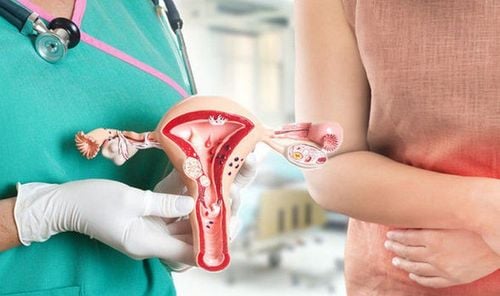This is an automatically translated article.
Most of us think that getting pregnant is something that happens naturally and easily. However, there are many unexpected reasons that will hinder this process, making it more difficult for women to get pregnant. Here are the most common causes of difficulty getting pregnant.1. You have a medical condition
Difficulty getting pregnant is a symptom of an underlying medical condition, not a diagnosis. Therefore, in order to treat infertility and maximize your chances of getting pregnant, you need to have a general examination, to rule out the possibility of gynecological diseases or diseases in other organs that affect your fertility. reproductive.In which, the following pathologies stand out:
1.1. Polycystic Ovarian Syndrome Polycystic Ovarian Syndrome occurs in 10% of women. This disorder in the reproductive system causes the body to instead produce follicle-stimulating hormones to overproduce androgens, disrupting ovulation, hindering ovulation, and impairing egg quality. This indirectly causes conception to fail.
What's more, women with PCOS also have irregular periods, are more prone to being overweight, have diabetes, and have heart problems.
Recommended video:
What is polycystic ovary?
1.2. Immune system disorders Autoimmune disorders will cause the body to attack its own cells such as rheumatoid arthritis, systemic lupus erythematosus ... At this time, the immune system disorder causes an excessive inflammatory response, destroying sperm as well as the newly fertilized embryo. As a result, the woman cannot become pregnant naturally.
1.3. Uterine fibroids and polyps Uterine fibroids and polyps are benign growths of tissue in the uterus. Symptoms patients may experience are heavy menstrual bleeding, prolonged duration and dysmenorrhea. In particular, if the neoplasm is too abnormal on the mucosa, it will interfere with the adhesion and nesting ability of the newly fertilized egg.
Not only that, even when the embryo has implanted and developed to a certain extent, these conditions can still increase the risk of miscarriage, extremely preterm birth or recurrent stillbirth. This makes the woman never pregnant successfully.
1.4. Endometriosis Endometriosis is a common condition that causes glandular tissue of the uterus to grow outside the lining of the uterus, such as on the ovaries or fallopian tubes, or into the muscle layer of the uterus. The typical symptoms suggestive of this pathology are heavy dysmenorrhea, irregular menstrual cycle and menstrual blood volume.

1.5. Endocrine system disorders The endocrine system contains hormones that help control the function of organs in the body. In particular, difficulty conceiving can also be caused by the body not producing enough hormones related to the pregnancy process, reducing egg quality, delaying ovulation as well as weakening the ability of the embryo to implant. into the endometrium. Some common pathologies that disrupt the reproductive endocrine system are thyroid dysfunction, adrenal gland dysfunction, and diabetes.
1.6. Sexually Transmitted Diseases Some sexually transmitted diseases can damage the uterus and fallopian tubes, limiting fertility. The infection also prevents the embryo's ability to implant in the uterus, causing an early miscarriage.
1.7. Cancer Cancer in general can affect almost every function of the body, including fertility.
Moreover, when undergoing treatment, radiation or chemotherapy will make a woman prone to repeated miscarriages, even female infertility, as well as difficult to ensure that it does not affect the fetus. Accordingly, the risk of giving birth to a child with birth defects is very high.
Trắc nghiệm: Bạn có hiểu đúng về dấu hiệu mang thai sớm?
Các dấu hiệu mang thai sớm không phải chỉ mỗi trễ kinh mà còn có rất nhiều dấu hiệu khác như xuất huyết âm đạo, ngực căng tức,… Điểm xem bạn biết được bao nhiêu dấu hiệu mang thai sớm thông qua bài trắc nghiệm này nhé!
2. You're too impatient about being pregnant
Stress is always a huge barrier during pregnancy. When you are anxious, often stressed, blood cortisol levels rise, negatively impacting ovulation and fertility.Precisely because pregnancy is really an “event” that cannot be planned, so take it slow, calm, maximum relaxation, do not rush. Pregnancy will be a miracle that happens unexpectedly. Even a normal, healthy couple still takes about a year to get pregnant. And if at least six months have passed and you haven't had a regular period or you're not sure if you're ovulating, it's a good idea to seek help from an obstetrician-gynecologist early.

3. You chose the wrong time to have intercourse
Some women think that the more sex, the easier it is to get pregnant, but that's not true. If you do, you could inadvertently deplete your partner's sperm count.Besides, not understanding ovulation is a common mistake. For most women, ovulation occurs mid-cycle, but that's true if the cycle is between 28 and 32 days.
Exactly, women ovulate 14 days before the start of their cycle. For example, if you have a 24-day cycle, you will ovulate on day 10. This rule can be confusing if you have irregular periods or can't remember when you last had your period.
Another common mistake is not counting the actual first day of the cycle. It's the first day that you see your period bleeding, not the next day or the day before.
Once you have determined the exact time of ovulation, you only need to have intercourse every day during the most fertile period, ie around the time of ovulation. The rest of the days, the cycle should be spaced out and mostly just relaxing together.
4. You clean your private area too rough
Although douching is a fairly common hygiene practice among women, it's definitely not a good idea when you're trying to get pregnant. This is because douching products can act as a spermicide. Moreover, these chemicals change the vaginal pH, disrupting the natural environment of your vagina and also your uterus, making it difficult for the embryo to stick.5. You have the wrong posture
Although it has not been proven, the fact is that after intercourse, if you lie flat on the bed, hips elevated, for about 20 to 30 minutes can increase fertility by up to 80%. In other words, when you're done making love, don't be too hasty to get up, run to the bathroom or do a douche, or even want to do a dance. Instead, hold back, at least a little.6. You have an unhealthy lifestyle

Accordingly, it is necessary to give up all bad habits and act as if you are pregnant. Having a healthy lifestyle, eating nutritious food and getting enough sleep, exercising will not only help you have good health but also be ready for childbirth and motherhood.
Pregnancy is the magical journey every woman looks forward to. Mastering the above will help women's pregnancy process go more smoothly.
In order to maximize fertility and ensure a healthy pregnancy, before planning a pregnancy, both husband and wife should have a reproductive health check from 3-5 months. You will be examined for fertility, sexual health, screening for sexually transmitted diseases, and screening for genetic diseases. In particular, this examination process will be able to detect early causes that can lead to infertility and infertility so that early intervention measures can be taken. Doctors will also advise on the best time to give birth and measures to be able to give birth to healthy and intelligent children.
Currently, Vinmec International General Hospital is implementing basic and advanced pre-marital reproductive health packages. This examination package will help you know your health status, promptly treat and prevent the risk of diseases if any, supplement the necessary nutrients, create the best conditions for the fetus to develop right away. From the time of pregnancy, it helps to identify risk factors related to genetics, especially in cases where the parents are suffering from obstetric and gynecological diseases, chronic diseases, have been pregnant or gave birth to a child with the disease. birth defects. In particular, Vinmec has Vinmec Fertility Support Center, the leading modern center in Vietnam, built and applied a treatment process that combines comprehensive examination, combining both male and female obstetrics and gynecology to provide the optimal solution for each customer case. The medical team are highly qualified and experienced experts, capable of synchronously and comprehensively deploying the most advanced assisted reproductive techniques today.
Vinmec Stem Cell and Gene Technology Research Institute is located next to Vinmec Fertility Center, convenient for consulting and diagnosing genetic diseases. After performing the necessary screening tests for both men and women, the doctors will analyze the results and give advice tailored to each case. All customer information is kept confidential, ensuring privacy.
If you have a need for a pre-marital health check-up at Vinmec, please book an appointment directly at the website for service.

Please dial HOTLINE for more information or register for an appointment HERE. Download MyVinmec app to make appointments faster and to manage your bookings easily.
Reference source: verywellfamily.com; todaysparent.comRecommended video:
Vinmec applies AI to culture embryos with IVF, opportunities for infertile families













